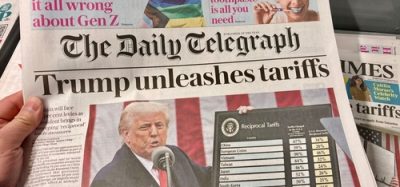Brexit and the food and beverage industry
- Like
- Digg
- Del
- Tumblr
- VKontakte
- Buffer
- Love This
- Odnoklassniki
- Meneame
- Blogger
- Amazon
- Yahoo Mail
- Gmail
- AOL
- Newsvine
- HackerNews
- Evernote
- MySpace
- Mail.ru
- Viadeo
- Line
- Comments
- Yummly
- SMS
- Viber
- Telegram
- Subscribe
- Skype
- Facebook Messenger
- Kakao
- LiveJournal
- Yammer
- Edgar
- Fintel
- Mix
- Instapaper
- Copy Link
Posted: 26 May 2017 | Stephanie Anthony (New Food) | 1 comment
For New Food, the biggest question remains, what will be the impact on the UK’s Food & Beverage industry?


The UK voted to leave the European Union in the 23 June 2016 EU referendum. The government is now preparing to leave the EU, and Article 50 has been triggered. However, what this will mean for the future is still uncertain, there are many concerns still being raised with no definite answers being supplied. At the moment all we can do is speculate.
Trade
In late March a coalition of leading trade bodies issued a joint statement to the Secretary of States and Ministers at the Department for Exiting the European Union, the Department for International Trade, the Department for Environment, Food and Rural Affairs, and the Department for Business, Energy & Industrial Strategy, highlighting core objectives and priorities for UK trade policy. The British Retail Consortium (BRC), the National Farmers Union of England and Wales (NFU) and the Food and Drink Federation (FDF), which represent the whole of the supply chain from farm to fork, will work with the Government to agree common objectives and priorities for the UK’s trade policy environment post-Brexit. Farmers, manufacturers and retailers rely on exports and imports – the regulatory framework that governs this international trade therefore matters to all, both in strengthening and supporting UK producers in domestic and foreign markets, and in affording UK consumers and the agri-food and drink industry the benefits of freer trade with overseas partners. Currently, that framework is determined by the EU, internally through the Single Market and Customs Union, externally through the EU’s Common Commercial Policy.
For New Food, the biggest question is, what will be the impact on the UK’s Food & Beverage industry?
The Prime Minister has made clear that these arrangements will change when the UK leaves the EU. The new framework for the UK’s trading relations will be determined in part through negotiation with the EU, in part through negotiations with other countries, and in part by the UK acting alone. Key points are to engage in formal trade negotiations and establish cooperation on regulatory equivalence, undertake detailed economic impact assessments which take into consideration any other benefits for UK traders of existing EU preferential trade arrangements, and all in all making sure the transition is as smooth as possible, and a positive change rather than a negative one.
Economy
Already some have raised concerns about the economic impact of Brexit – money markets do not appreciate uncertainty, and as this limbo stage continues, without clear answers, sterling has been unstable. Consumers have experienced prices soaring, as well as some products threatened to be unavailable. In early March butter prices were up 15%, fish 8% and the traditional British tea 6.6%. This was following the Brexit-related sharp fall in the pound. By and large however, things have gone on as before – but, the UK has not actually left the EU yet. Most reports and currency strategists say sterling is likely to remain volatile in the coming months, until there is greater clarity. The Bank of England has already taken steps to boost the economy, for example by cutting interest rates, which are unlikely to go up any time soon.
Agriculture
Concerns have also been raised by UK farmers, about the impact of Brexit on agriculture. From a purely British economic perspective, there is apprehension that agriculture looks set to suffer following the UK’s exit. First things first, the UK agriculture industry relies on a migrant workforce, and heavily so. Approximately one third of the UK’s food processing sector’s workforce (120,000) is comprised of EU migrant workers. As the UK’s agriculture industry relies so heavily on a migrant workforce there are fears over the travel impacts that will most probably occur when the UK is no longer a member of the EU. The fact that nothing is certain is worrying and any comments on Brexit remain ambiguous. The unknown is precisely what worries the wider agriculture (and indeed every) sector in the UK. In addition to the labour and economic impacts of Brexit on farmers (due to loss of EU subsidies and possible trade barriers), there is also the concern that nations with lower food standards, animal welfare standards and environmental protection will come into competition with the British market, putting pressure on UK regulation. However, the previous system was by no means perfect. Issues with subsidies have already been raised, in that the EU’s common agricultural policy (CAP) which in theory offers agricultural subsidies to those in need, was not reaching the small farmers who needed it most.
The Prime Minister has made clear that these arrangements will change when the UK leaves the EU. The new framework for the UK’s trading relations will be determined in part through negotiation with the EU, in part through negotiations with other countries, and in part by the UK acting alone.
A revised distribution policy for subsidies has been suggested, which would help those who are struggling and improve the environmental sustainability of farming. However, the UK agriculture industry remains reasonably low priority on the Brexit agenda, for the amount it contributes to the economy in comparison with other areas such as manufacturing. This might in turn create a fairer post-Brexit agricultural landscape for the UK, though evidently the subsidies would subsequently have to come directly from Westminster and not Brussels. And with no significant clarification from the UK government, UK farmers remain unclear as to whether to invest in technology while their industry faces a withdrawal of £3bn-worth of EU subsidies.
Industry comments on Article 50
NFU PRESIDENT MEURIG RAYMOND
Our industry is vital to Britain. We have to take this opportunity to tell the country – and the world – of our high standards; of the pride we have in the food we produce and the importance of our industry. Farming and food production plays a crucial role in the life and economy of our country and therefore it is important this government ensures food and farming is at the forefront of their priorities as they negotiate our exit from the EU. “Agriculture is at the heart of this country of ours. It produces the raw ingredients for the largest manufacturing sector here – food and drink. This sector is worth £108 billion, employs nearly four million people and generates around £18 billion worth of export earnings annually.
Farming and food production plays a crucial role in the life and economy of our country.
“The NFU is already engaging heavily with key personnel in UK Government – last week I met with Secretary of State Andrea Leadsom and was pleased that she shared our ambition to maintain free and open trade with the EU once we leave. Defra also acknowledged the need to ensure that future reforms to the immigration system accommodate the labour requirements of the food and farming sectors. “This is a monumental time in the nation’s history. We are being given a once-in-a-generation opportunity to shape the future of UK agriculture. We can now work with government to shape a domestic agricultural policy that promotes competitive, profitable and progressive farm businesses, designed to meet the specific needs of UK farmers.”
NOAH CHAIR CAT SAYER
“Exit from the EU offers opportunities for our vibrant and innovative UK animal health market, including further possibilities for animal medicines businesses to thrive. “The UK is in a strong position to be a global centre of excellence for animal health, supporting innovative product developments with a regulatory model that assists both local and international trade. It is good to see science, research and innovation included as a key pillar in the Government’s Industrial Strategy Green Paper. Our sector, with its important role in food production and societal wellbeing as well as the support it gives to the economy is an important part of that. “The UK’s EU Exit must be achieved in a manner that will allow the opportunities it presents to our sector to come to fruition.”
HELEN DICKINSON OBE, CHIEF EXECUTIVE OF THE BRC
“Ensuring that consumers continue to enjoy great quality, choice and value on goods depends on a continuation of tariff-free trade on all products traded between the UK and the EU. Whether through reaching a new trading relationship quickly or securing a phased implementation deal, this must be at the heart of plans for a smooth and orderly Brexit.”
IAN WRIGHT FDF DIRECTOR GENERAL
“The triggering of Article 50 provides us with a definitive timeframe for the UK to exit the EU and the clock is ticking. We hope this means we can move swiftly from the realm of speculation into one where real issues are being resolved. “The results of the negotiation will have lasting implications – for our people, businesses and economy. Food is at the heart of our culture, identity and security. It is vital that the Government prioritises food and drink.
It is vital that the Government prioritises food and drink.
“FDF on behalf of manufacturers, alongside our partners across the food chain, will work tirelessly to help government to secure the best possible outcomes on future trade, access to the right workforce, regulation and ensuring a seamless border with the Republic of Ireland.”
CROP PROTECTION ASSOCIATION CHIEF EXECUTIVE OFFICER SARAH MUKHERJEE
“Our exit from the EU will provide the UK with an opportunity to become a global leader in crop protection research and development. “As the Brexit negotiations commence we are keen to work with government departments to help develop a regulatory environment that encourages investment in innovation, supports productive agriculture, and at the same time protects and enhances our environment.”
MELLA FREWEN, DIRECTOR GENERAL OF FOODDRINKEUROPE
“EU-27 food and drink trade with the UK is worth some €45 billion, making it our largest trading partner. Exchanges both ways will be greatly affected by this decision, with economic consequences which still remain to be fully understood. “The time has come for both parties to engage in meaningful negotiations, to create certainty for citizens and business. We encourage negotiators to work for the best deal, one that keeps barriers to an absolute minimum.”
Summary
There are three key areas that are affected by Brexit; trade, which will depend on the relationships that can be maintained and deals that can be made; farmers and British agriculture, which relies heavily on migrant workers; and the economy, which is damaged by the uncertainties Brexit poses. In conclusion I can’t provide any answers, much as I wish I could, and it seems that even those in a position to are reluctant to say anything definite. We can just hope that the transition will be as smooth as possible, and that our good relationship with the European Union, though no doubt due to change, will not be damaged as a result.
Issue
Related topics
Related organisations
Crop Protection Association, Food and Drink Federation (FDF), National Farmer's Union (NFU)









thanks for your informative post. I think so it’s such stupid decision. It will create a bigger problem food and beverage industry.